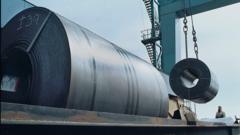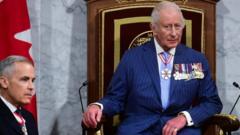In a significant first step, incoming Chancellor Friedrich Merz has secured parliamentary approval to bypass constitutional spending limits as he prepares to unveil his ambitious infrastructure plan to revive Germany's deteriorating infrastructure.
Germany's Infrastructure Crisis: The New Government's Vision for Recovery

Germany's Infrastructure Crisis: The New Government's Vision for Recovery
Friedrich Merz's administration plans to revolutionize Germany's crumbling infrastructure amid financial challenges.
Germany, once celebrated for its robust infrastructure and engineering, now faces a critical juncture as its systems falter. On April 10, 2025, in a strategic move, Friedrich Merz, poised to become the new chancellor, successfully convinced Parliament to allow increased military spending by circumventing existing constitutional debt restrictions. This decision, however, raises concerns; instances of crumbling bridges serve as stark reminders that the nation’s infrastructure has long been neglected.
For years, previous administrations shied away from investment due to fears of accruing debt, resulting in a systemic decline of public works. The recent change will enable the new government to borrow up to 500 billion euros (approximately $556 billion) over the next twelve years, specifically targeting infrastructure enhancements. Of this amount, 200 billion euros will be allocated to regional governments as well as a climate fund. In the immediate term, the ruling coalition, comprising Merz's Christian Democrats and the Social Democratic Party, anticipates investing 150 billion euros directly into infrastructure projects by the end of their tenure in 2029.
As discussion unfolds regarding Germany’s future physical and economic landscape, practical strategies will need to be implemented to balance military readiness with vital domestic repairs—a complex undertaking that could shape the nation’s trajectory for decades to come.





















